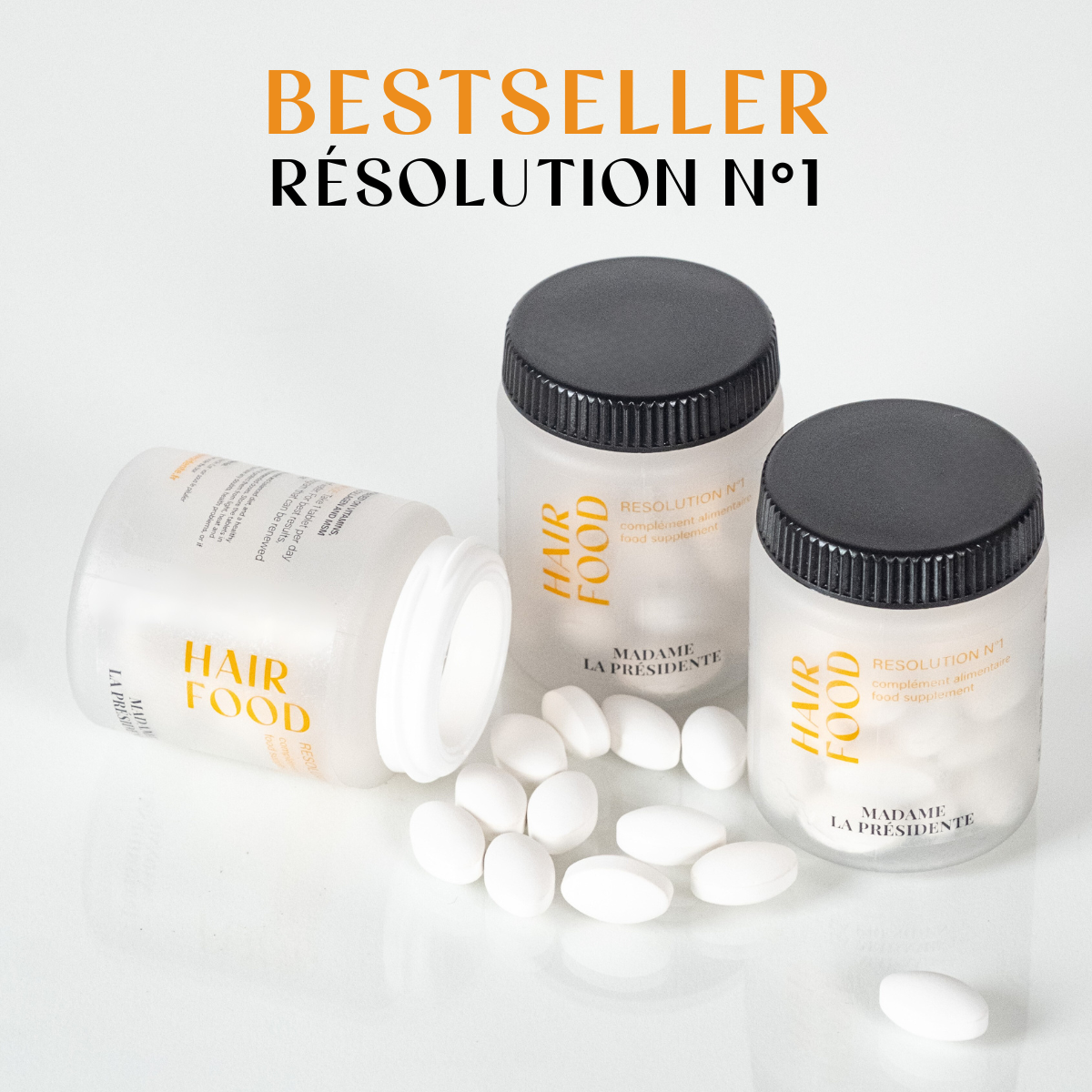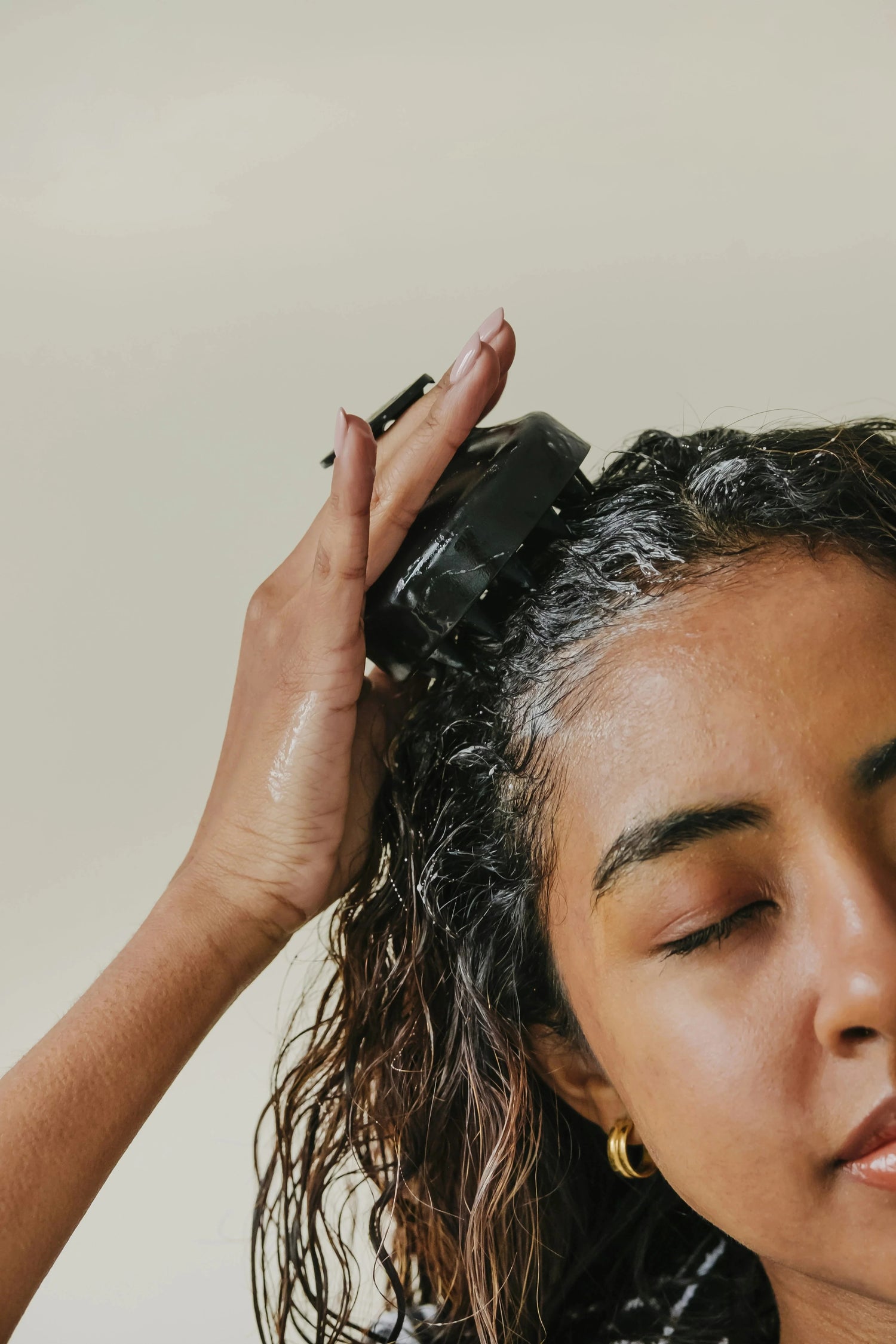Conditioner plays a key role in hair care . It is an essential element in maintaining hair health.
It detangles, moisturizes, and protects hair by forming a protective layer that makes brushing easier and reduces breakage. In addition, it is vital for the scalp, helping to minimize pulling when detangling and rebalance the pH of the hair after using alkaline shampoos.
In summary, conditioner is a valuable ally in your hair care routine, ensuring healthier and more resistant hair.
The Many Functions of Conditioner

Hydration and nutrition of hair
Conditioner is essential for hair hydration and nutrition , providing water and essential nutrients such as vegetable oils and butters to preserve the health and vigor of the hair fiber.
Especially for dry and damaged hair, a moisturizing conditioner can provide deep regeneration, thanks to ingredients such as coconut oil and mango butter , nourishing and protecting the hair effectively.
For those looking for an even gentler alternative, Madame la Présidente's co-wash is an excellent option. This innovative product, combining cleansing and care, allows you to wash your hair without damaging it, while providing intense hydration. Enriched with baobab oil, known for its nourishing properties, and hibiscus, which provides suppleness and shine, it gently cleanses without damaging the hair fiber. Ideal for all hair types, whether textured or fragile, it maintains the hair's natural balance while facilitating detangling.
It is essential to differentiate between hydration and nutrition: hydration provides water to make hair supple and shiny, while nutrition provides nutrients to strengthen and protect the hair fiber. A wisely chosen conditioner can merge these two aspects, ensuring well-hydrated and nourished hair.
Easy to detangle and style
Using conditioner makes detangling and styling hair much easier.
By enveloping the hair fiber in a protective sheath, it reduces knots and frizz, making combing and styling easier. This property is particularly valuable for curly, frizzy or kinky hair, which is often more prone to tangling and dryness.
Protection against external aggressions
Conditioner provides protection against external aggressions, such as the sun, heating appliances, and pollutants. By forming a protective barrier, it preserves the health and integrity of the hair, limiting damage related to these factors.
It may also incorporate special ingredients, such as heat protectants, providing enhanced protection when using heating appliances.
Improved texture and shine
Finally, conditioner plays a key role in improving hair texture and shine . With its moisturizing and nourishing action, it makes hair softer, more supple and shiny. Ingredients like provitamin B5 and shea butter help restore shine to damaged hair, giving it back volume and definition.
The different types of conditioners and their specificities
Moisturizing conditioners
Designed for intense hydration , moisturizing conditioners are especially beneficial for dry, damaged, or frizz-prone hair. They often contain ingredients like coconut oil, mango butter, or jojoba oil , which are essential for sealing the cuticle and retaining moisture. These products discipline and control hair while giving it a brilliant shine .
Repairing conditioners
The repairing conditioners, enriched with proteins and restorative active ingredients , are formulated for damaged or weakened hair. Perfect for hair that has undergone chemical treatments, coloring, or exposed to heating appliances, these products help repair the hair fiber and reduce breakage by up to 95%, thus revitalizing weakened hair.
Volumizing conditioners
Designed for fine or flat hair lacking structure and volume, volumizing conditioners provide elasticity and body without weighing it down. Formulated with lightweight ingredients, they help restore volume and lightness to fine hair.
Conditioners for colored or treated hair
Conditioners for colored or treated hair act as a protective shield to preserve cosmetic color and revive shine. They prevent color fading while providing essential nutrition and hydration. For bleached hair, they can also reduce orange tones and maintain color uniformity.
When and how to use conditioner?

The ideal frequency of use
How often you should use conditioner will vary depending on your hair type and condition. For fine hair, it is recommended to apply conditioner every other day to make it easier to detangle without weighing it down. For thick hair, which requires more intense hydration, using conditioner every time you wash it is recommended.
It is even possible to use the conditioner between washes , leaving it to act as a light mask. For colored hair, using the conditioner after each shampoo is essential to maintain the color and health of the hair, protecting it from external aggressions and preserving its shine.
Application method for maximum effectiveness
For optimal application of conditioner, start by washing your hair with shampoo and rinse it thoroughly. Then apply one to two hazelnut-sized amounts of conditioner to wet hair, avoiding the roots so as not to make it greasy. Pay special attention to the ends and lengths , and use a wide-toothed comb to distribute the product evenly and make detangling easier.
Leave the conditioner on for two to three minutes before rinsing thoroughly. For best results, let your hair air dry or use a hair dryer on medium heat, being careful not to get the nozzle too close to your hair.
Rinse or leave on: what should you choose?
The choice between rinsing out conditioner or leaving it in depends on the type of product and your needs. Rinse-out conditioners, which are the most common, should be removed after a few minutes to avoid weighing down your hair. It is essential to rinse thoroughly to remove all residue.
Leave-in conditioners, such as sprays or lotions, are designed to stay on the hair until the next wash. They are especially suitable for thick, curly or frizzy hair, helping to moisturize and make styling easier.
Deep care hair masks or conditioners, which should be left on for 20 to 30 minutes before rinsing, are recommended for dry and damaged hair, providing intensive nutrition and hydration .
Tips for Choosing the Right Conditioner for Your Hair Type
Assess your hair's needs
To select the ideal conditioner, it is essential to understand the specific needs of your hair.
Dry, damaged hair will benefit from a hydrating, nourishing conditioner that seals the cuticle to lock in moisture. For those with curly or coily hair, opt for a detangling, hydrating conditioner to define curls and minimize frizz.
If you have oily hair, opt for a lightweight conditioner that won't weigh down your hair. Color-treated hair requires a protective conditioner that preserves color and restores shine.
The importance of ingredients: what to look out for?

Ingredients are essential in choosing your conditioner.
For dry, damaged hair, look for products enriched with nourishing oils such as coconut oil, mango butter or jojoba oil. These components help to hydrate and repair the hair fiber.
For colored hair, choose conditioners with antioxidants and color-protecting agents, such as fruit extracts or vitamins. For fine hair, opt for light, non-greasy products containing stimulating and strengthening ingredients such as provitamin B5 or soy proteins.
Leave-in conditioner: for whom and why?
Leave -in conditioners are perfect for those requiring continuous hydration and nourishment.
They are ideal for damaged, dry or frizzy hair, as they nourish the hair intensely without requiring rinsing, making it easier to detangle and style.
Also recommended for hair lacking volume, they provide lightness and suppleness without weighing it down. It is important to select a leave-in conditioner that is suitable for your hair type to avoid any overload or product build-up.
Mistakes to Avoid with Conditioner
Application to the roots: a trap to avoid
One of the most common mistakes when using conditioner is applying it directly to the roots. This can weigh down the hair and promote a greasy effect, especially for hair that tends to get greasy quickly. It is essential to start applying the conditioner on the lengths and ends, focusing on the most damaged or dry areas.
This helps maintain hair volume while providing the necessary hydration and nutrition .
Excess product and its consequences
Using too much conditioner can have negative consequences on the health and appearance of your hair. Too much product can weigh hair down , make it greasy, and reduce its volume. It is recommended to start with a small amount of product and add more as needed, rather than risk overloading your hair.
This approach allows you to benefit from the benefits of conditioner without compromising the lightness and suppleness of your hair.
Choosing a product that is not suitable for your hair type
Choosing a conditioner that doesn't match your hair type is a common mistake that can be detrimental to the health and appearance of your hair. For example, if you have fine, oily hair, a moisturizing and nourishing conditioner can weigh it down and make it look greasy.
Likewise, dry and damaged hair requires a conditioner that is specifically formulated to moisturize and repair it . It is essential to select a product that meets the specific needs of your hair to maximize the benefits and avoid unwanted effects.
Conclusion
Conditioner plays a vital role in your hair care routine, providing the moisture, protection, and nourishment that are essential to maintaining the health and beauty of your hair. Selecting the right conditioner for your hair type is essential, taking into account its unique needs, whether it’s dry, color-treated, or curly.
Proper application , avoiding the roots and leaving the product on for a few minutes, is essential to maximize its beneficial effects. Squeeze out excess water from your hair before applying conditioner to ensure better absorption of the active ingredients. By following these tips and making conditioner an integral part of your routine, you will transform the health and appearance of your hair, making it softer , stronger , and more manageable. So, embrace this essential hair care product for visible and long-lasting results.
Is it necessary to use conditioner?
Using a conditioner is essential to maintain the health and beauty of your hair. It helps detangle, moisturizes, nourishes the hair, restores the pH of the hair fibers, and protects the scalp.
However, people with oily hair may not need it. It is especially recommended for dry, colored, damaged, or long hair.
Why use conditioner before shampooing?
Applying conditioner before shampooing, a method known as "reverse washing," allows you to take advantage of the conditioner's nourishing properties without weighing your hair down. This technique detangles and nourishes your hair before washing, ensuring lightness and ease of detangling, which is ideal for fine hair or hair that tends to get greasy quickly .
What is the difference between a mask and a conditioner?
The main difference between a mask and a conditioner lies in their action and use . Conditioner acts on the surface to quickly detangle, soften, and moisturize hair, often in less than 5 minutes, and is used after each wash. A mask, on the other hand, offers a deeper action, restructures the hair fiber, and is applied once or twice a week, requiring a setting time of at least 15 minutes.
The mask is richer and designed to deeply repair and nourish dehydrated or damaged hair.
Does conditioner clean hair?
Conditioner does not have cleansing properties: it mainly acts as a moisturizer and detangler . It is the shampoo that is responsible for cleaning, while the conditioner nourishes and moisturizes the hair after washing.


